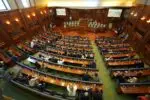Following the decision by the Election Complaints and Appeals Panel (PZAP) to overturn the Central Election Commission’s (CEC) refusal to certify the Serb List, the political party may now participate in Kosovo’s October 12 local elections.
The panel’s ruling has sparked sharp reactions from security experts, who view the Serb List as a threat to Kosovo’s sovereignty and constitutional order. Several party representatives face charges related to violence against journalists and participation in violent protests in northern Kosovo.
Last week, the CEC refused certification of the Serb List, citing that its candidates posed a security risk to the Republic of Kosovo. Members argued that the party operates as an extension of Serbia in Kosovo and has been active in protests and barricades in the north, often in direct opposition to Kosovo institutions.
One widely publicized case involves Slavko Simić, accused of participating in the May 16, 2023, protest in Leposavić, where Serb demonstrators attacked journalists. Prosecutors allege that Simić and others used concrete blocks, stun grenades, and other dangerous objects, leaving two journalists seriously injured.
Security expert Avni Islami warned that the Serb List’s participation is part of Serbian President Aleksandar Vučić’s strategy to undermine Kosovo’s democratic institutions. He emphasized links between the Serb List and the group led by Radoičić, described as a terrorist and criminal organization.
“The Serb List and similar parties, such as the Democratic Alternative, have shown opposition to Kosovo’s interests and sovereignty. Legally, they should be prohibited from participating, as in other democracies where extremist parties attempting to destabilize the state are barred,” Islami stated.
Another analyst, Nuredin Ibishi, highlighted the dual nature of the issue: administrative and judicial. He noted that the Serb List clearly represents Belgrade’s interests and has been involved in barricades and protests in northern Kosovo.
“Administrative decisions go through the CEC and PZAP, while criminal or civil cases follow judicial procedures. Many Serb List members have been involved in northern border blockades and other disruptive actions,” Ibishi explained.
Despite these warnings, the PZAP ruling allows the Serb List to participate in the upcoming local elections. However, with ongoing accusations, criminal charges, and challenges to Kosovo’s sovereignty, the electoral process is expected to be highly sensitive and contested.







